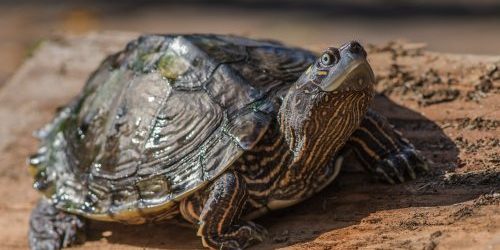Online Nature Education: Kindness Towards Turtles
Turtles could use a little kindness from us humans right now. Many turtles are in danger of disappearing due to habitat destruction, new diseases, getting hit by cars and lawnmowers, and the pet trade. In this article, we are going to learn how we personally can be kind and help turtles.
Turtles have a home range that is relatively small. Turtles cannot fly or drive, so most species live in an area the size of a few football fields. In their home range, they know where food and water sources are and where to hibernate during winter. Scientists have studied turtles that have been moved out of their home range and the relocated turtles did not fare well because they were not able to find food, water, or hibernation sites. Also, relocating turtles can spread disease to other turtles and wildlife – so it is very important to remember to never relocate a turtle to a new area.
If you see a turtle crossing a road, and it is safe for you to stop and go to the turtle (only adults should go into the street!), you can pick the turtle up and move it IN THE DIRECTION IT WAS HEADING to the other side of the road. Keep in mind that all turtles can bite, so pick the turtle up from behind and keep away from the front of the turtle. Hold the turtle by supporting it with both hands from above and below. After you put the turtle down on the other side of the road, WASH YOUR HANDS. Even if they appear healthy, any turtle could be a carrier of salmonella, so it is important to wash your hands after touching a turtle.
Snapping turtles and other large turtles could be too heavy or dangerous to pick up. If you encounter a big or “bitey” turtle, I advise using a large flat shovel to scoop the turtle up to move it to the other side. If no shovel is available, you may be able to encourage the turtle to move the other side by gently prodding it from behind with a pole or other long, blunt object. But remember to be gentle and careful. And just a note – never hold turtles by their tail as that could lead to an injury to the turtle.

Another kindness you can show turtles is to not keep them as pets. When a turtle is taken from the wild, the entire local population is negatively impacted because turtles have a very slow reproductive rate. Every adult turtle in a given population is critical.
Other reasons not to keep turtles as pets include:
- Turtles have very specific care and feeding requirements that most people find hard to manage. And each species of turtle requires its own specialized food and care.
- If cared for correctly, turtles can live well over 50 years! Many pet turtles become unwanted because of their care needs and they are not as engaging as a dog or cat. Pet turtles can not be released back into the wild because they could spread diseases to other turtles and wildlife – so keeping a turtle as a pet is just not a good idea at all.
- Turtles can carry salmonella that could be spread around the home by a pet turtle. Salmonella is especially dangerous to young children and people who are imminocompromised.
If you find an injured or sick turtle, contact a wildlife rehabilitation center for advice on how to proceed. You can find the nearest wildlife rehabilitation center by searching online or contacting your local animal control agency, animal shelter, or a nature center near you. Injured wildlife should only be treated by licensed wildlife rehabilitators or veterinarians – do not attempt to care for an injured turtle yourself.
It is TURTLE-LY awesome to be kind towards turtles.
Kids Activity Idea: Kindness Towards Turtles Poster
Materials: Paper, and crayons, markers or paint
After reading this article and watching the video, ask your children to think about how they can be kind to turtles. Then, have them draw or paint a poster showing their idea. The poster could be posted online to remind other friends and family how to be kind to turtles also.
And I would LOVE to see any Turtle Kindness posters your child or children create! Email them to [email protected] or share them at https://www.facebook.com/kidsnatureshows
Looking for more online nature education? Check out all the virtual Kids Nature Shows available and book your fun and educational online experience today!







